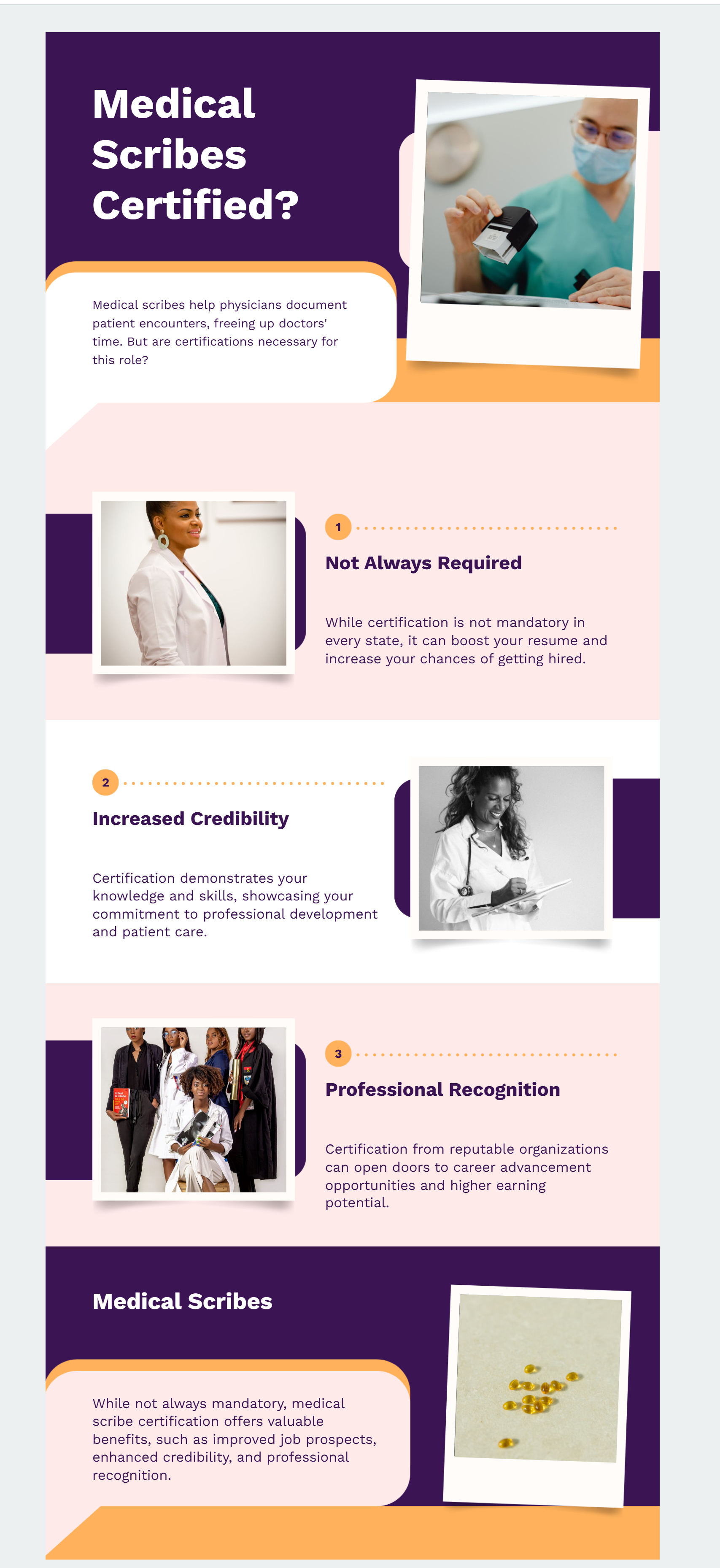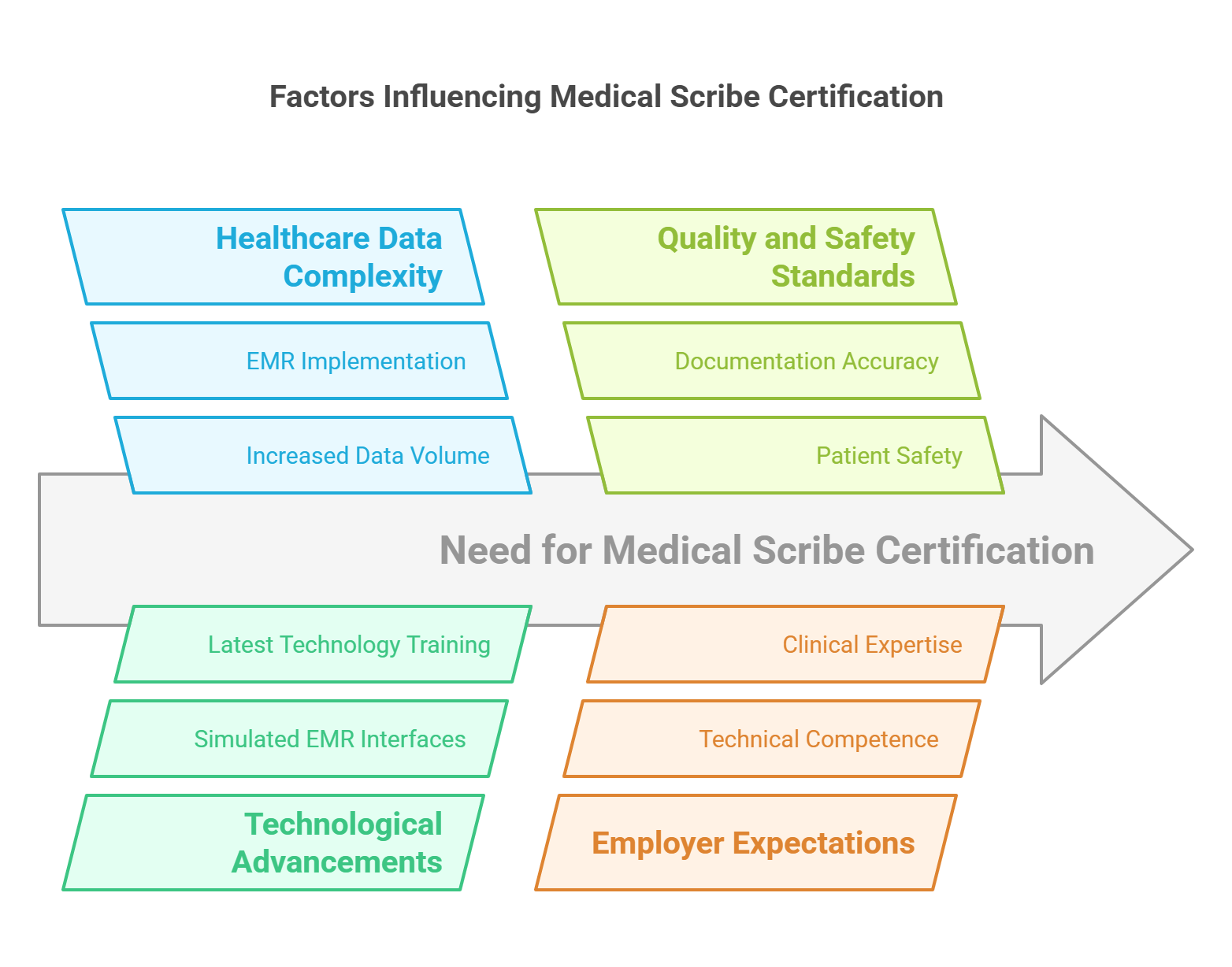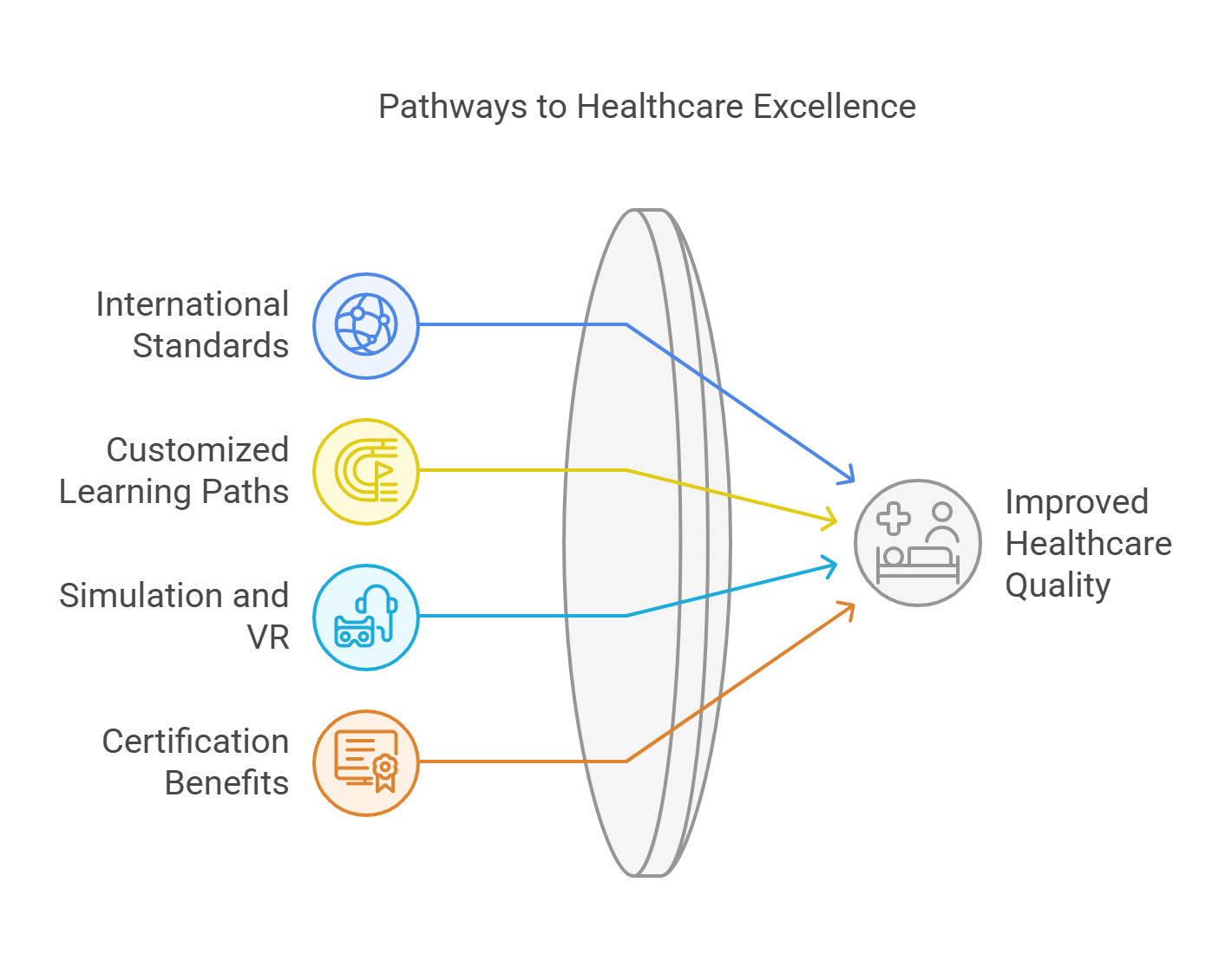Do medical scribes need certification ?
Ever wonder if a medical scribe’s certification is as essential as that first cup of coffee on a groggy Monday morning? Grab your favorite mug and settle in, because we’re about to take you on a funky, data-packed ride through the vibrant world of medical scribe certification in 2025!
Understanding Medical Scribe Certification in 2025
Health care is changing, and the medical scribe is now more than ever a vital part of the patient’s healthcare delivery system as we move forward. But as we move forward to 2025, the question is, Do medical scribes need certification?
Certification is a process by which a body or an organization confirms the capability of an individual in a particular field. For medical scribes, who function as go-betweens for the medical professionals and the documentation of the patient’s information, certification is gradually turning into a certification standard. Historically, the medical scribe position was considered as additional. In the beginning, many scribes were trained on the job, based on experience rather than education or certification. But, with the increase in healthcare data, the implementation of EMR, and the need for patient safety, documentation of clinical encounters has become more complex. At the moment, certification is seen as a significant indicator that scribes possess the technical competence and clinical expertise necessary to work in a demanding environment, by employers and healthcare facilities. In 2025, certification programs have developed and improved. They now include simulated EMR interfaces, technical training that includes the latest technology, and case-based learning. These programs aim to not only test the clinical knowledge of the candidate but also their competency to manage complicated healthcare applications to document facts correctly and quickly. The development of certification is in line with the general direction of the healthcare sector, which is characterized by increasing structure, quality, and safety. With the medical scribe career growing as an essential part of the healthcare team, the issue of whether medical scribes should or should not be certified is less about the need and more about the quality.
Elevating Professional Standards
Certification is not just a piece of paper, it is the symbol of professional excellence. An employer, a certified medical scribe is someone who meets strict standards for training, technical skills and clinical knowledge. Increasingly, in an era where medical errors can have profound consequences, it is important that every member of the healthcare team be competent and knowledgeable. Certified scribes not only are very good at capturing complex medical narratives, but also are familiar with confidentiality and compliance protocols.
Enhancing Patient Safety and Quality of Care
The concerns of healthcare in 2025 include patient safety most of all. Thus, the accuracy and timeliness of documentation provided by medical scribes is crucial for the quality of patient care they receive. These standards have recently been enhanced to include more comprehensive training in error prevention, data security, and regulatory compliance, thus decreasing the likelihood of documentation errors that could have implications for patient safety. Research indicates that hospitals that use certified scribes have a noticeable lower rate of charting errors, which in turn has a positive impact on patient results.
Building Trust with Healthcare Providers and Patients
For many clinicians and for patients, trust is paramount. Certification matters. It adds credibility — from healthcare teams, to, one might say, in the eyes of patients. When a medical scribe is certified, it is an indication of a certain level of professionalism and commitment to the craft. This not only helps the relationship with physicians in the workplace to be stronger but also reduces patients’ concerns about who has access to their medical information and whether it’s being handled well.
Advancing Career Opportunities
To any upcoming medical scribe, certification is the key to better career opportunities. Many times, certified scribes have better job opportunities, higher salaries, and faster career growth than their counterparts who are not certified. By the year 2025, certification is expected to become a key differentiator in an increasingly competitive job market that will help distinguish the more qualified scribes from the rest.
Integrating Technology and Clinical Expertise
The use of technology in healthcare has revolutionided the way scribes work. The new certification programs also include training in the latest EMR systems, telehealth platforms and data analytics tools. This makes certified scribes not only clinically proficient, but also tech savvy – a combination more and more in demand in the digital healthcare setting.
Data-Driven Decision Making
Recent data analyses from industry leaders have underscored the importance of standardized documentation in improving clinical workflows. Certified scribes are better equipped to contribute to these improvements, using their validated skills to streamline data entry processes and enhance the overall efficiency of healthcare delivery.
A Myriad of Certification Programs
While there is no universal mandate requiring medical scribes to be certified, the proliferation of certification programs reflects the growing recognition of the role’s importance. Notable programs include:
Certified Medical Scribe Professional (CMSP): Offered by the American College of Medical Scribe Specialists (ACMSS), this program focuses on a comprehensive understanding of clinical terminology, EMR proficiency, and documentation best practices.
Medical Scribe Certification & Aptitude Test (MSCAT): Provided by the American Healthcare Documentation Professionals Group (AHDPG), MSCAT emphasizes both theoretical knowledge and practical application in real-world scenarios.
Advanced Scribe Certification (ASC): A newer entrant to the certification field, ASC integrates simulation-based learning with interactive modules to prepare scribes for the fast-paced, technology-driven healthcare environment of 2025.
Evolving Standards and International Benchmarks
As the role of the medical scribe becomes more integral to global healthcare, international standards for certification are emerging. These standards aim to harmonize training and competency evaluation across different countries, ensuring that certified scribes possess a universally recognized skill set. Organizations and consortiums across North America, Europe, and Asia are collaborating to establish these benchmarks, setting the stage for more consistent and reliable patient care worldwide.
Customized Learning Paths and Modular Training
One of the most exciting developments in certification training is the move towards modular, customizable learning paths. Recognizing that not all scribes come from the same background, many certification programs now offer tailored modules that address varying levels of clinical experience and technical proficiency. This flexibility allows individuals to build upon their existing knowledge while acquiring new skills relevant to modern healthcare practices.
The Role of Simulation and Virtual Reality
Advances in simulation technology and virtual reality (VR) have revolutionized certification training. Scribes can now immerse themselves in virtual clinical environments where they practice documenting patient encounters in real time. These simulations not only help in solidifying clinical knowledge but also provide hands-on experience with the latest EMR systems and patient management software.
The Case for Certification
Assurance of Competency and Standardization
Certification acts as a standardized measure to ensure that all medical scribes meet a baseline level of competency. This uniformity is critical for maintaining high-quality documentation, minimizing errors, and ultimately enhancing patient safety. In healthcare settings where precision is paramount, certification is a cornerstone for trust and accountability.
Enhanced Professional Credibility
Employers and patients alike are more inclined to trust certified professionals. For scribes, certification is a badge of honor that signals a commitment to excellence and continuous improvement. It serves as a tangible demonstration that the individual is not only capable but also dedicated to upholding the highest standards of practice.
Better Career Opportunities and Advancement
Certified scribes often enjoy enhanced job prospects and competitive salaries. Many healthcare institutions now view certification as a prerequisite for advanced roles or leadership positions within medical documentation teams. By obtaining certification, scribes can position themselves for rapid career advancement in a competitive market.
Improved Patient Outcomes
It is important to have accurate and timely documentation for quality patient care. Certification programs emphasize critical skills that are direct to patient safety offsets from error prevention to adherence to regulatory guidelines. Healthcare providers can be more confident with the accuracy of the patient records with certified scribes which in turn lead to better overall outcomes.
The Case Against Certification
Financial and Time Constraints
One of the primary arguments against mandatory certification is the financial and time investment required. Certification programs can be costly and time-consuming, particularly for individuals who are just starting out or those who are already juggling multiple responsibilities. Critics argue that these barriers could deter talented individuals from entering the field.
Inconsistent Training Standards
Another concern is the lack of a universally recognized training standard. With a variety of certification programs available, there is a risk of inconsistent training quality. Not all programs may adequately prepare scribes for the demands of modern healthcare, leading to disparities in skill levels among certified professionals.
Potential Limitation of Diversity
Mandatory certification might inadvertently limit the pool of applicants. Individuals from underrepresented or economically disadvantaged backgrounds might find the costs and requirements prohibitive. This could result in a less diverse workforce, which in turn may affect the range of perspectives and ideas in clinical documentation.
Overemphasis on Certification Over Experience
Some industry experts caution that certification should complement, rather than replace, on-the-job training and practical experience. Relying solely on certification as a marker of competency may overlook the invaluable skills that come with hands-on experience in real-world clinical settings.
Federal and State Regulations in 2025
Whilst there is no single overall federal mandate that spells out the necessity of medical scribe certification, several states have put forward their own set of regulations to ensure that there are set rules and regulations for training and oversight of the scribes. Many of these regulations are in line with the best practices and are meant to protect the patients by ensuring that scribes are competent. Where regulation is particularly strong, certification can aid healthcare facilities to meet the requirements of particular state laws.
International Regulatory Trends
Globally, healthcare regulators are recognizing the value of certified scribes. Countries in Europe and Asia are beginning to adopt standardized certification protocols similar to those in North America. This international convergence is driving a more uniform standard of care, making it easier for healthcare organizations to employ scribes across borders.
The Role of Professional Organizations
The role of professional organizations in establishing and preserving standard for medical scribe certification is also crucial in setting. These include the American College of Medical Scribe Specialists (ACMSS) and the American Healthcare Documentation Professionals Group (AHDPG), which are leading the way in the development of overall certification programs. Besides being focused on improving the quality of clinical documentation, their efforts are also directed towards the improvement of the learning and development process, as well as the promotion of a professional culture.
Ensuring Data Security and HIPAA Compliance
In 2025, data security and HIPAA compliance have taken center stage. Certification programs now include modules on electronic data protection, ensuring that scribes are fully aware of the privacy laws governing patient information. By adhering to these rigorous standards, certified scribes help mitigate the risk of data breaches and enhance overall trust in the healthcare system.
What Employers Look for in a Certified Medical Scribe
Healthcare institutions are under constant pressure to deliver top-notch patient care while maintaining efficiency. For employers, hiring a certified medical scribe is an investment in quality and reliability. Certified scribes bring:
Enhanced Accuracy: Their validated skills lead to fewer documentation errors.
Improved Efficiency: Certification ensures that scribes are proficient with advanced EMR systems and clinical workflows.
Regulatory Compliance: Certified professionals are well-versed in HIPAA regulations and other compliance requirements.
Better Team Integration: Their training often includes communication and teamwork skills, making them valuable members of clinical teams.
The Patient’s Perspective
Patients, too, benefit from the expertise of certified medical scribes. When patients know that their medical records are handled by professionals who have passed stringent certification processes, their confidence in the quality of care increases. This trust is vital for effective patient-provider relationships, and it ultimately contributes to higher patient satisfaction scores.
Case Studies and Real-World Examples
A large urban hospital recently mandated certification for all its medical scribes. Within a year, the institution reduced charting errors by 25 percent and improved patient wait times significantly. These results not only improved patient care but also improved the hospital's reputation as a leader in innovative healthcare practices. A regional clinic entered into a partnership with a certification body to offer in-house training for scribes. The program was a success, and the clinic noticed better workflow efficiencies and higher physician satisfaction, which indicates that when scribes are certified, everyone comes out on top.
Continuous Learning in a Rapidly Changing Field
Certification is not a one-time event—it’s a commitment to lifelong learning. The healthcare landscape is continuously evolving, and certified medical scribes are expected to keep abreast of the latest developments in medical technology, clinical practices, and regulatory requirements. Many certification programs now require ongoing education credits, ensuring that scribes remain at the cutting edge of their field.
Expanding Career Pathways
Certification can be the launchpad for diverse career opportunities for scribes as well. There are opportunities not only in hospitals and clinics but also for certified scribes to move into specialties like radiology, cardiology and emergency medicine. Some have even taken their healthcare career to advanced levels in healthcare administration or medical informatics. In addition, to the skills enhanced through certification, scribes become attractive candidates for leadership positions in clinical documentation teams.
Impact on Salary and Job Satisfaction
Several healthcare surveys seem to confirm that certified scribes earn more than their counterparts without the certification. Paying for certification is well worth it in the job stability, career growth, and overall satisfaction that it yields. In a field where accuracy and speed are important, the confidence that comes with certification is directly translated into better performance and, therefore, better patient care.
Mentorship and Networking Opportunities
One of the often-overlooked benefits of certification is the opportunity to join a community of like-minded professionals. Certified scribes gain access to exclusive events, forums, and mentorship programs that facilitate networking and professional growth. This community can be invaluable for career advancement, as it provides a platform for sharing best practices, troubleshooting challenges, and celebrating successes.
Financial and Time Investment
While certification offers numerous benefits, it is not without its challenges. Many aspiring scribes face financial hurdles when enrolling in certification programs, especially when coupled with the costs of continuing education. Additionally, the time commitment required to study for and pass certification exams can be significant—particularly for those balancing work and personal responsibilities.
Addressing the Diversity Dilemma
Critics of mandatory certification argue that it may limit opportunities for individuals from diverse backgrounds. However, many modern certification programs are actively working to reduce these barriers. Scholarship programs, flexible learning options, and online modules are increasingly available, making certification more accessible to a broader range of candidates.
Ensuring Standardization and Quality
One of the key challenges is ensuring that all certification programs meet a high standard of quality and consistency. With multiple programs available, there is a risk of significant variability in training and assessment. Industry leaders are addressing this challenge by collaborating on standardized curricula and benchmarking best practices across certification bodies.
Leveraging Technology for Better Training
The future of medical scribe certification lies in leveraging technology to overcome these challenges. With advances in e-learning platforms, virtual reality, and AI-driven assessments, training programs are becoming more interactive, immersive, and efficient. These technological tools not only reduce costs and time barriers but also ensure that scribes are well-prepared for the complexities of modern healthcare.
Opportunities for Innovation
The certification process itself is also an area that is ripe for innovation. Some forward thinking programs are already incorporating gamification elements, real time feedback systems, and performance analytics to create a more engaging and effective learning experience. These innovations are revolutionizing the traditional model of certification into a dynamic and interactive process that can better prepare scribes for real world challenges.
The Role of Artificial Intelligence
As we advance further into 2025, the integration of artificial intelligence (AI) in healthcare is no longer a futuristic concept—it’s a present-day reality. AI-powered tools are being used to assist in documentation, flag potential errors, and even predict patient outcomes. Certified scribes who are adept at working alongside these technologies will be highly sought after. In fact, many certification programs now include specialized modules on AI and machine learning applications in clinical documentation.
Remote and Virtual Certification Programs
The COVID-19 pandemic accelerated the shift towards remote work and virtual learning. In response, certification programs have adapted by offering fully online training and assessment options. This shift has made certification more accessible to individuals regardless of their geographical location, allowing for a more diverse pool of applicants. Virtual reality (VR) simulations are also becoming commonplace, providing hands-on experience in a controlled, digital environment.
Global Standardization of Certification
With the increasing globalization of healthcare, there is a growing push for internationally recognized certification standards. Collaborative efforts among professional organizations across continents are paving the way for certifications that are valid not only in the United States but globally. This global standardization will make it easier for certified scribes to work in diverse healthcare settings around the world.
Increased Emphasis on Continuing Education
The pace of change in healthcare technology means that ongoing education is more critical than ever. Future certification programs will likely require scribes to earn a certain number of continuing education credits annually. This ensures that certified professionals remain up-to-date with the latest advancements, regulatory changes, and best practices.
Data-Driven Enhancements
Big data analytics is playing a crucial role in shaping the future of certification. By analyzing performance data from certified scribes, training organizations can identify areas for improvement and update curricula accordingly. This continuous feedback loop is making certification programs more responsive and tailored to the evolving needs of healthcare providers.
Specialized Certification Tracks
The one-size-fits-all approach is giving way to specialized certification tracks. For instance, scribes working in high-acuity areas like emergency medicine or intensive care may receive additional training specific to those environments. This specialization not only enhances the quality of care in critical settings but also opens up niche career opportunities for certified scribes.
Data Insights and Database Resources
The healthcare industry is awash with data, and certification trends are no exception. Recent studies indicate that hospitals employing certified medical scribes report:
Up to a 30% improvement in documentation accuracy.
A 20–25% reduction in patient wait times.
Enhanced patient satisfaction scores by over 15%.
These statistics are more than just numbers—they underscore the real-world impact of having a well-trained, certified workforce in clinical settings. For those interested in exploring more detailed data on the subject, the HealthData.gov database offers a treasure trove of information. This comprehensive resource provides insights into healthcare trends, patient outcomes, and the effectiveness of various training programs, making it an invaluable tool for both practitioners and administrators.
People Also Ask: Top 8 Questions Answered
Do medical scribes need certification to work in hospitals?
While certification is not universally mandated, many hospitals prefer certified scribes due to the enhanced accuracy and reliability they bring to patient documentation.What does medical scribe certification involve?
Certification typically covers clinical terminology, EMR proficiency, regulatory compliance, and hands-on training through simulations and case studies.How does certification improve patient safety?
Certified scribes have demonstrated expertise in documentation and data security, reducing the risk of errors that could compromise patient safety.Can certification lead to better job opportunities for scribes?
Yes, certification is often associated with improved career prospects, higher salaries, and faster career advancement in the competitive healthcare field.Is online certification as effective as in-person training?
Modern virtual certification programs leverage interactive modules, VR simulations, and real-time assessments, offering an equally robust learning experience.How often do scribes need to renew their certification?
Many certification programs require periodic renewal through continuing education credits to ensure that scribes stay current with industry advancements.What are the costs associated with certification?
Costs vary by program and region, but many organizations offer flexible payment options and scholarships to make certification more accessible.What is the future of medical scribe certification?
The future is bright—with advancements in AI, global standardization, and specialized training, certification will continue to be a key driver in professional development.
10 Lesser-Known Facts about Medical Scribe Certification
Simulation-Based Mastery:
Many advanced certification programs now use state-of-the-art VR simulations to mimic real-life clinical scenarios, providing an immersive learning experience that goes far beyond traditional classroom methods.
Link: https://www.virtualwareco.com/news/virtual-reality-medical-simulation/
Customized Learning Modules:
Programs increasingly offer tailored learning paths based on a candidate’s prior experience, allowing both newcomers and experienced scribes to benefit from customized training.
Interdisciplinary Training:
Some certification courses integrate training in related fields such as medical coding, health informatics, and patient communication, giving certified scribes a broader skill set.
Link: https://acmso.org/medical-scribing/scribing-101-fundamentals-of-scribing
Global Standardization Efforts:
International collaborations are underway to create a universal certification standard, ensuring that scribes are equipped with globally recognized skills.
Data-Driven Improvements:
Certification programs now regularly analyze performance data from graduates to continuously refine and update their curricula, ensuring they meet current industry needs.
Specialized Tracks:
Certain programs now offer niche certifications, such as for emergency medicine scribes or radiology scribes, which focus on the unique demands of those specialties.
Integration with AI Tools:
Future-focused certifications include training on AI-driven documentation tools, preparing scribes to work seamlessly alongside cutting-edge technology.
Enhanced Soft Skills Training:
Beyond technical proficiency, many certification programs now include modules on communication, empathy, and teamwork—skills that are essential for effective patient care.
Real-Time Feedback Systems:
Some certification courses incorporate live feedback during training sessions, enabling immediate corrections and accelerated learning curves.
Digital Credentialing:
Graduates receive digital badges and verifiable credentials that are easily shareable on professional networks, adding transparency and trust during the hiring process.
For more in-depth data and research on the evolving role of medical scribe certification, visit HealthData.gov and explore their comprehensive healthcare databases.
Conclusion: Your Future in Medical Scribe Certification
In conclusion, as the world continues to progress further into 2025, the argument regarding whether or not medical scribes should be certified has gradually become a multi-dimensional one involving quality, safety, and professional growth. It is now becoming apparent that certification is going to be a significant part of the modern healthcare documentation—meaning that scribes will not only need to know clinical terminology and how to navigate EMR, but will also need to be able to adapt to new technologies and regulations.
The advantages are obvious: improved safety for the patient, more accurate work, better career opportunities, and therefore, a better performance of the healthcare system as a whole. However, challenges including the cost of certification and the lack of uniform training standards continue to exist, but developments and technology are available to help ensure that certification can be more affordable and easier to obtain. If you are a medical scribe or scribing student or a professional wanting to enhance your skills, certification is a way up in this evolving profession.
For those who want to take their career to the next level, remember that the journey doesn’t end with certification—it’s an ongoing commitment to continuous learning and professional development. And if you’re ready to make a real impact, check out https://acmso.org/. We have the best Medical Scribe Certification, Advanced Medical Scribe Training for 2025.









